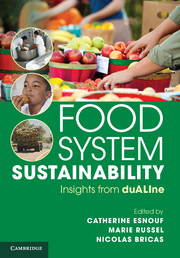Book contents
- Frontmatter
- Contents
- Foreword
- Acknowledgements
- Introduction
- 1 Context: new challenges for food systems
- 2 Consumption and consumers
- 3 Carbon footprint and nutritional quality of diets in France
- 4 Food systems
- 5 Industrial organisation and sustainability
- 6 Urbanisation and the sustainability of food systems
- 7 Losses and wastage
- 8 International trade, price volatility and standards for sustainability
- 9 Elements for a foresight debate on food sustainability
- 10 A critical panorama of methods used to assess food sustainability
- Conclusion
- References
- List of abbreviations
- List of duALIne experts
- Index
1 - Context: new challenges for food systems
Published online by Cambridge University Press: 05 April 2013
- Frontmatter
- Contents
- Foreword
- Acknowledgements
- Introduction
- 1 Context: new challenges for food systems
- 2 Consumption and consumers
- 3 Carbon footprint and nutritional quality of diets in France
- 4 Food systems
- 5 Industrial organisation and sustainability
- 6 Urbanisation and the sustainability of food systems
- 7 Losses and wastage
- 8 International trade, price volatility and standards for sustainability
- 9 Elements for a foresight debate on food sustainability
- 10 A critical panorama of methods used to assess food sustainability
- Conclusion
- References
- List of abbreviations
- List of duALIne experts
- Index
Summary
The global food context is characterised by growing uncertainties and increasing constraints.
The two sides of the global equation for food self-sufficiency are known: the planet will have to provide food for more than 9 billion people in 2050, while satisfying growing non-food demands because of the increasing rarity of fossil energy sources, all in the context of development that is respectful of both the environment and human beings. The joint INRA–CIRAD Agrimonde foresight study (Paillard et al., 2010) showed that achieving these ambitions is not impossible if certain conditions are met; in particular, a sustainable increase in yields on the supply side and an improvement in the use of agricultural products at different stages, including a reduction in losses and wastage between the farm gate and the consumer’s plate, and possible reductions in, or modifications to, the content of different diets on the demand side. Increased and more secure trade is also necessary, insofar as Africa and Asia, where the greatest population rises are anticipated, will remain deficient in agricultural and food products. Finally, the food context of the future is characterised by increasing uncertainties and considerable constraints.
- Type
- Chapter
- Information
- Food System SustainabilityInsights From duALIne, pp. 5 - 26Publisher: Cambridge University PressPrint publication year: 2013



